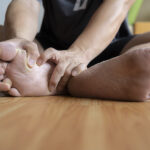By Bonnie Jenkins, Advanced Natural Medicine
If you’ve ever gotten a charley horse or banged your funny bone, you know how painful it can be. But if you suffer from peripheral neuropathy, these odd sensations aren’t just an occasional nuisance.
People with peripheral neuropathy endure tingling and burning in the hands and feet, numbness in the legs, muscle weakness and cramping. Because it affects the nerves, some people also experience a decreased sensitivity to pain and temperature. And since the condition primarily affects the feet and legs, peripheral neuropathy often causes a loss of balance.
While peripheral neuropathy is a common side effect of diabetes (and the cause most researchers focus on), the condition can also develop because of trauma, infection, nutritional deficiencies and exposure to environmental toxins. One largely ignored cause is excessive alcohol use.
Which brings me to a question one reader, Carl, has. He wants to know if there are any new or effective therapies for peripheral neuropathy caused by alcohol abuse. Well Carl, there are, but you won’t find them in a pharmacy or doctor’s office.
The Whys and Wherefores
Peripheral neuropathy results from damage to the peripheral nerves – an intricate network of nerves that connect the central nervous system (the brain and spinal cord) to the muscles, skin and internal organs. The ulnar nerve that runs through your funny bone and the sciatic nerve that goes down the leg are peripheral nerves.
If the peripheral nerves are damaged, the normal messages that travel from the brain to other parts of the body are interrupted. When this communication is short-circuited, it causes a progressive deterioration in both the small and large nerve fibers.
When the small fibers are affected, people often have the feeling of “pins and needles” in their lower extremities. Large fiber neuropathy may result in loss of reflexes and motor dysfunction such as weakness, unsteadiness and balance problems.
Open your arteries, improve blood flow for a new health miracle...
Did you know your circulatory system has over 60,000 miles of arteries, veins and other blood vessels, if stretched end to end?
But as you age, your blood vessels undergo changes, which may cause them to stiffen, thicken and get clogged.
GOOD NEWS! Doctors have now identified a “Miracle Molecule” inside your arteries that helps OPEN your arteries and IMPROVE blood flow.
It’s what Dr. Valentin Fuster calls it, "One of the most important discoveries in the history of cardiovascular medicine."To you, that means...
- Healthy blood pressure
- Sharper mind and memory
- Skyrocketing energy and muscular strength
- Increased pleasure and passion in the bedroom
- Improved circulation to every cell and organ in your body
Go here to discover a new natural way to significantly boost the levels of this miracle molecule in YOUR body NOW!
Among the more serious aspects of the condition is the loss of balance, especially for older people. In fact, if you have peripheral neuropathy that affects the feet and legs, studies show that you are about 20 times more likely to fall than people whose peripheral nervous system is working properly.
Older adults with peripheral neuropathy have difficulty sensing the position of their feet and how much their ankles are turned inward or outward. As a result, their center of gravity can easily shift too far without their realizing it – making them unstable. And since the feet and ankle muscles in people with peripheral neuropathy develop strength slowly, they are far less likely to recover when they wobble. In one study, neuropathy patients could stand on one foot without teetering for only 3.8 seconds while a group of healthy volunteers achieved 32.3 seconds.
Underneath It All
Underlying conditions, like excessive alcohol use or diabetes, are usually at the root of peripheral neuropathy, which is actually a symptom of the greater problem. So addressing the source is critical to lasting relief. For diabetics, this means controlling blood sugar levels. For alcohol neuropathy, it means that you need to stop drinking.
Now I realize that accomplishing this is easy to say, but it can be extremely difficult to do, especially if you suffer from an alcohol addiction. But studies have shown that if you continue drinking heavily after peripheral neuropathy sets in, the prognosis for improvement is bleak. In one retrospective study, researchers found that, of the 156 alcohol-induced neuropathy patients they evaluated, more than half suffered from other alcohol-related problems, including liver disease, seizures and cerebral conditions.
But here’s the good news – nerve damage brought on by excessive alcohol consumption can often be improved after a patient becomes alcohol-free.
Take the “B” Train
People who drink often or heavily (even an occasional bout of heavy drinking can cause peripheral nerve problems) often have a vitamin B deficiency, especially B12. But they aren’t alone. Science has discovered that neuropathy patients who are malnourished or are diabetic can also suffer from a vitamin B12 deficiency.
So, does that mean if you take supplemental vitamin B12 the problem will disappear? Not exactly. Vitamin B12 comes in several forms, but only one of these forms, methylcobalamin, is effective against peripheral neuropathy. Unfortunately, the most common form of B12 – the kind found in vitamin supplements – is cyanocobalamin. And, even though cyanocobalamin is converted to methylcobalamin in the liver, it doesn’t do so in therapeutically significant amounts.
Are You Suffering From...
- Love handles and a pot belly
- Romance that isn't what it used to
- Forgetfulness and inattention
- Low (or no) strength and endurance
- A sex drive that's shifted into neutral...or worse
If so...you may have Mature Male Burnout. Click here to discover more about this unique condition and what you can do about it.
Methylcobalamin works directly on the myelin sheath that insulates nerve fibers. But its affect may go beyond just halting the progression of the neuropathy. In the mid-1990s, animal studies by Japanese researchers found that high doses of methylcobalamin regenerated both neurons and the myelin sheath that protects peripheral nerves.
How does that translate to us humans? To find out, another team of Japanese researchers tested methylcobalamin on nine patients with diabetic neuropathy. Each were given an injection of 500 mcg. of methylcobalamin three times a week for six months and monitored for pain and nerve conduction.
By the end of the study, the researchers discovered that all of the patients’ pain had lessened. But that wasn’t the end of the story. The speed at which the nerves communicated also improved, and all without side effects.
In another clinical trial, participants were treated with 2,500 mcg. of methylcobalamin. Not only did their symptoms (tingling, burning and heaviness) improve, the benefits lasted up to four years after treatment.
Taken together, these two studies have led some scientists to suggest that ultra-high doses of this novel form of vitamin B12 can actually regrow healthy nerve function in those suffering from peripheral neuropathy. And healthy peripheral nerves are essential for regaining equilibrium.
Even though both of these studies administered methylcobalamin intravenously, evidence suggests that oral methylcobalamin is just as effective. Look for supplements designed to be taken sublingually since methylcobalamin may degrade if digested.
One Last Thing …
Another supplement that may help ease the symptoms of peripheral neuropathy is alpha lipoic acid (ALA). In a joint randomized placebo-controlled study by the Mayo Clinic and Moscow’s Russian Medical Academy for Advanced Studies, researchers teamed up to examine the effects of ALA on 120 patients with diabetic neuropathy. While one group received 600 mg. of intravenous ALA daily for 14 days, the other was given a placebo. Progress was determined by evaluating patient surveys and by testing nerve conduction, sensation and nervous system function. By the end of the study, the researchers concluded that ALA “significantly and rapidly” reduced both the severity and frequency of diabetic neuropathy symptoms.
A second double-blind multi-center trial assigned 328 diabetic patients with peripheral neuropathy to receive treatment with intravenous infusion of ALA using three doses (1,200 mg; 600 mg; 100 mg) or a placebo over three weeks. Pain, burning, paresthesia (your foot falling asleep) and numbness decreased significantly from baseline to day 19 in the patients who received 1,200 mg. or 600 mg. of ALA compared to those given 100 mg. No change was experienced by the subjects in the placebo group.
Taken alone, ALA seems to relieve many of the symptoms of peripheral neuropathy. But new evidence shows that taking a combination of ALA and sublingual methylcobalamin increases the amount of ALA available to the peripheral nerves. Since neither of these nutrients have shown any adverse side effects, even at high doses, this just might be the answer Carl – and anyone else suffering from peripheral neuropathy – is looking for.
This Just In …
If you’re hearing sounds that aren’t really there, you aren’t crazy. You may just be suffering from tinnitus. It’s a condition my mom has suffered with for more than 40 years.
Tinnitus is a common hearing problem characterized by a ringing, buzzing or roaring sound. And, my mom will be the first to tell you that it’s extremely irritating because it’s with you 24/7. But a recent study has found that a common mineral just might help tinnitus sufferers get some peace and quiet.
In the study, 41 people with tinnitus were randomly assigned to receive either 50 mg. of zinc or a placebo daily. At the end of two months, 46 percent of the people in the zinc group experienced a decrease in the volume and frequency of their tinnitus. The researchers also noted that the mineral seemed to work regardless of the participants’ zinc status at the beginning of the study.
So if you’re hearing noises, try supplementing with zinc. But a word of caution: over a long period of time, high doses of zinc may cause a copper deficiency. So it’s a good idea to check the label on your multivitamin and make sure that it includes copper.
References:
“Antioxidant Alpha Lipoic Acid Significantly Improves Symptoms of Diabetic Neuropathy” Ascribe Newswire, 4/7/03, ascribe.org
Arda HN, et al. “The role of zinc in the treatment of tinnitus.” Otology and Neurotology. 2003; 24:86-89.
Kemppainen R, et al. “Drinking habits andperipheral alcoholic neuropathy.” Acta Neurologica Scandinavica. 1984; 65:11-18.
Kuwabara S, et al. “Intravenous methylcobalamin treatment for uremic and diabetic neuropathy in chronic hemodialysis patients.” Internal Medicine. 1999; 38:472-475.
Watanabe T, et al. “Ultra-high dose methylcobalamin promotes nerve regeneration in experimental acrylamide neuropathy.” Journal of Neurological Science. 1994; 122:140-143.






